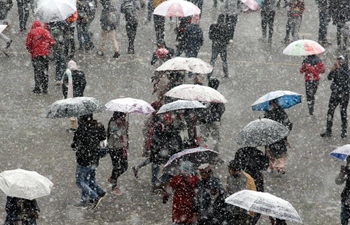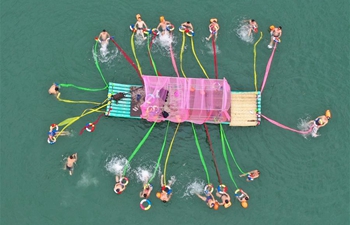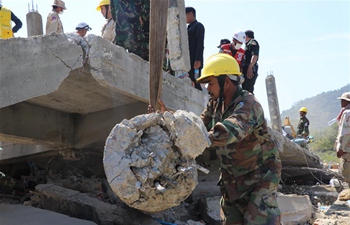by Saud Abu Ramadan
GAZA, Jan. 4 (Xinhua) -- Several Gaza-based factions and military wings are on alert for any possible escalation as a result of the U.S. killing of senior Iranian commander Qassem Soleimani, according to local Palestinian analysts.
The analysts said these political factions and military wings in Gaza, mainly the Islamic Hamas movement and the Palestinian Islamic Jihad, "are so strong," which vowed a powerful avenge to Soleimani's assassination.
Early on Friday, Soleimani, commander of Quds Force of Iranian Islamic Revolution Guards Corps, and Abu Mahdi al-Muhandis, deputy chief of Iraq's paramilitary Hashd Shaabi forces, were killed in a U.S. drone strike near Baghdad airport, sparking outrage among some political factions and military wings in Gaza.
Hani al-Masri, director of the Ramallah-based Palestinian Center for Policy Research & Strategic Studies, told Xinhua that the assassination of Soleimani and any upcoming escalation that may erupt in the region will be a hot start, leading to possible large changes in the region and in the entire world.
He suggested that all Palestinian parties should study all possible scenarios and get ready to all possibilities amid the serious regional and international concerns of a possible escalation in the region.
Ismail Haniyeh, politburo chief of Hamas said in a statement that the assassination of Soleimani "will lead to serious consequences in the region and Palestine."
"Hamas leaders follow, evaluate the current developments and consequences and will take the needed positions," said Haniyeh.
The Israeli media also reported that Israel sent indirect letters of warnings to the Hamas and Islamic Jihad movements, in case they try to respond to the assassinations of Soleimani.
Adnan Abu A'amer, a political science professor at the Gaza-based al-Ummah University told Xinhua that the assassination of Soleimani "will open the door widely for possible serious escalations."
"Iran expected that Soleimani will be assassinated by Israel, then Iran would easily respond. But when the assassination was carried out by the United States, the Iranian retaliation, either against Israeli or American targets, would be so difficult," said Abu A'amer.
He said that the possible escalation after the assassination of Soleimani will personally serve Israeli Prime Minister Benjamin Netanyahu "simply because this situation would rescue him from the crisis of the formation of the Israeli government."
The Fatah-dominated Palestinian Authority, based in areas of the West Bank since the Hamas-Fatah split in 2007, didn't issue any official comment to the assassination of the Iranian commander. But various factions and military wings in the Hamas-ruled Gaza Strip mourned Soleimani.
Hamas said in an emailed press statement that it sends its condolences to Iran for the death of Soleimani "who played a significant role in backing the Palestinian armed resistance."
"The ongoing U.S. crimes that create tension in the region serve the criminal Israeli enemy," it said, adding that it holds the United States "fully responsible for the bloodshed in the Arab region."
The less-influential pro-Iran Palestinian Islamic Jihad said in a press statement that the resistance movement in the region "won't be confused or influenced by the assassination of Soleimani, and that resistance will continue."
The Palestinian left-wing faction, the Popular Front for the Liberation of Palestine (PFLP), also said in a press statement that the assassination of Soleimani is "a quantum leap in the U.S. aggression and wars it wages in the region."
Hassan Abdo, a Gaza-based political analyst told Xinhua that the Iranian response to the crime of the assassination of Soleimani "is certain," adding that the question "is when, how and where?"
"The killing of Soleimani will open the gates of hell against the dominant colonial powers in the region," said Abdo.
He said this incident "will allow armed resistance to fight the Israeli-U.S. domination in the Gulf area and the entire Middle East."
He added that the consequences of any escalation in the Middle East "may lead to a war that will produce a victorious, strong and challenging pro-Iran axis and strengthen its position in the region."
Israel's foreign ministry and its security apparatuses declared a status of security alert and increased guarding of its embassies all over the world for fear of immediate retaliation in response to the killing of Soleimani.
However, Israel didn't refer to any direct and specific threats, but it put into considerations sudden attacks that might be launched from the Palestinian territories, Lebanon, Syria and other Iran-backed military groups.
Mohamed Yaghi, a Palestinian writer and journalist from the West Bank, said that Iran has "a strategic reserve to defend it in Gaza, Syria, Lebanon and Iraq."
"The strategic reserve of Iran will be only activated when it will be attacked, so in this case Iran will ask from its allies for military backing," he wrote on Saturday an article in the Ramallah-based al-Ayyam newspaper.

















